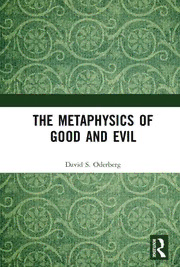Table Of ContentThe Metaphysics of Good and
Evil
The Metaphysics of Good and Evil is the first full-
length contemporary defence, from the perspective of
analytic philosophy, of the Scholastic theory of good
and evil – the theory of Aristotle, Augustine, Aquinas,
and most medieval and Thomistic philosophers.
Goodness is analysed as obedience to nature. Evil is
analysed as the privation of goodness. Goodness,
surprisingly, is found in the non-living world, but in the
living world it takes on a special character. The book
analyses various kinds of goodness, showing how they
fit into the Scholastic theory. The privation theory of
evil is given its most comprehensive contemporary
defence, including an account of truthmakers for truths
of privation and an analysis of how causation by
privation should be understood. In the end, all evil is
deviance – a departure from the goodness prescribed
by a thing’s essential nature.
Key Features:
• Offers a comprehensive defence of a venerable
metaphysical theory, conducted using the
concepts and methods of analytic philosophy.
• Revives a much neglected approach to the
question of good and evil in their most general
nature.
• Shows how Aristotelian-Thomistic theory has
more than historical relevance to a fundamental
philosophical issue, but can be applied in a way
that is both defensible and yet accessible to the
modern philosopher.
• Provides what, for the Scholastic philosopher, is
arguably the only solid metaphysical foundation
for a separate treatment of the origins of morality.
David S. Oderberg is Professor of Philosophy at the
University of Reading, England. He is the author of
many articles in metaphysics, ethics, philosophy of
religion, and other subjects. His books include Moral
Theory: A Non-Consequentialist Approach (2000),
Applied Ethics: A Non-Consequentialist Approach
(2000) and Real Essentialism (2007). He is also the
editor of several collections on ethics, logic, and
metaphysics. Prof. Oderberg edits Ratio, an
international journal of analytic philosophy.
The Metaphysics of Good
and Evil
David S. Oderberg
First published 2020
by Routledge
52 Vanderbilt Avenue, New York, NY 10017
and by Routledge
2 Park Square, Milton Park, Abingdon, Oxon, OX14 4RN
Routledge is an imprint of the Taylor & Francis Group, an
informa business
© 2020 Taylor & Francis
The right of David S. Oderberg to be identified as author of this
work has been asserted by him in accordance with sections 77
and 78 of the Copyright, Designs and Patents Act 1988.
All rights reserved. No part of this book may be reprinted or
reproduced or utilised in any form or by any electronic,
mechanical, or other means, now known or hereafter invented,
including photocopying and recording, or in any information
storage or retrieval system, without permission in writing from
the publishers.
Trademark notice: Product or corporate names may be
trademarks or registered trademarks, and are used only for
identification and explanation without intent to infringe.
Library of Congress Cataloging-in-Publication Data
A catalog record for this title has been requested
ISBN: 978-0-367-40864-0 (hbk)
ISBN: 978-0-367-80957-7 (ebk)
Typeset in Times New Roman
by Thomson Digital
To Penny, Eloise and Joshua with
love
Contents
Preface and Acknowledgements
Introduction
PART I
A Theory of Good as Fulfilment
1 The Basic Theory: Appetites and Fulfilment
1.1 Actuality and potentiality
1.2 Appetite as potentiality: the tendencies of
things
1.3 Seven objections to goodness as fulfilment
1.4 Fulfilment as non-arbitrariness: the principle
of finality
2 Developing the Scholastic Conception of
Goodness
2.1 Goodness as neither essentially moral nor
essentially organic
2.2 The attributive/predicative debate
2.3 Final and contributory goodness
2.4 Goodness ‘in a way’
3 A Case for Inorganic Goodness
3.1 Instantiation and approximation
3.2 Continuation in existence as a tendency
3.3 The objection from radioactivity
3.4 False analogies: inertia and conservation
3.5 Is existence itself good?
4 The Good in the Living
4.1 From inorganic to organic goodness
4.2 The good in the vegetative appetites
4.3 The good in the sensitive appetites
4.4 Sexual cannibalism and related objections
4.5 The good in the rational appetite
PART II
A Theory of Evil as Privation
5 In Defence of the Privation Theory
5.1 Privation and need
5.2 Privation and evil
5.3 Some painful objections
5.4 Objections from morality: malice and
punishment
6 Evil and Truthmaking
6.1 Truthmaker theory and negative truths
6.2 Absences
6.3 The totality theory
6.4 The exclusion theory
6.5 Truthmakers for privative truths
7 Evil as Cause and Effect
7.1 The fundamental problem
7.2 Absence causation
7.3 Privative causal truths
7.4 Armstrong's analysis: the contrast
8 The Reality of Evil
8.1 Non-negotiable truths about evil
8.2 Why it matters that evil is conceptual being
8.3 The reality of evil in the good
8.4 The mystery of evil
Bibliography
Index

